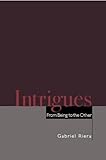Intrigues : From Being to the Other / Gabriel Riera.
Material type: TextPublisher: New York, NY : Fordham University Press, [2022]Copyright date: ©2007Description: 1 online resource (232 p.)Content type:
TextPublisher: New York, NY : Fordham University Press, [2022]Copyright date: ©2007Description: 1 online resource (232 p.)Content type: - 9780823226719
- 9780823291861
- online - DeGruyter
| Item type | Current library | Call number | URL | Status | Notes | Barcode | |
|---|---|---|---|---|---|---|---|
 eBook
eBook
|
Biblioteca "Angelicum" Pont. Univ. S.Tommaso d'Aquino Nuvola online | online - DeGruyter (Browse shelf(Opens below)) | Online access | Not for loan (Accesso limitato) | Accesso per gli utenti autorizzati / Access for authorized users | (dgr)9780823291861 |
Frontmatter -- Contents -- Acknowledgments -- List of Abbreviations -- Introduction -- 1. The Passion of Time: Au moment voulu (Nietzsche- Heidegger-Blanchot) -- 2. Dwelling: Between Poiēsis and Technē -- 3. The Enigma of Manifestation (Figuration in Heidegger) -- 4. Plot and Intrigue: from Being’s Other to the ‘‘Otherwise than Being’’ (Language, Ethics, Poetry in Levinas) -- 5. Art’s Inhumanity: ‘‘Reality and Its Shadow’’ -- 6. ‘‘The Writing of the Outside’’ (The ‘‘Potentialities of Literary Language’’ in Otherwise than Being) -- 7. The Unerasable Difference: Levinas in Blanchot -- Postface -- Notes -- Bibliography -- Index
restricted access online access with authorization star
http://purl.org/coar/access_right/c_16ec
Intrigues: From Being to the Other examines the possibility of writing the other, explores whether an ethical writing that preserves the other as such is possible, and discusses what the implications are for an ethically inflected criticism. Emmanuel Levinas and Maurice Blanchot, whose works constitute the most thorough contemporary exploration of the question of the other and of its relation to writing, are the main focus of this study. The book's horizon is ethics in the Levinasian sense: the question of the other, which, on the hither side of language understood as a system of signs and of representation, must be welcomed by language and preserved in its alterity. Martin Heidegger is an unavoidable reference, however. While it is true that for the German philosopher Being is an immanent production, his elucidation of a more essential understanding of Being entails a deconstruction of onto-theology, of the sign and the grammatical and logical determinations of language, all decisive starting points for both Levinas and Blanchot. At stake for both Levinas and Blanchot, then, is how to mark a nondiscursive excess within discourse without erasing or reducing it. How should one read and write the other in the same without reducing the other to the same? Critics in recent years have discussed an "ethical moment or turn" characterized by the other's irruption into the order of discourse. The other becomes a true crossroads of disciplines, since it affects several aspects of discourse: the constitution of the subject, the status of knowledge, the nature of representation, and what that representation represses (gender, power). Yet there has been a tendency to graft the other onto paradigms whose main purpose is to reassess questions of identity, fundamentally in terms of representation; the other thus loses some of its most crucial features. Through close readings of texts by Heidegger, Levinas, and Blanchot the book examines how the question of the other engages the very limits of philosophy, rationality, and power.
Mode of access: Internet via World Wide Web.
In English.
Description based on online resource; title from PDF title page (publisher's Web site, viewed 03. Jan 2023)


